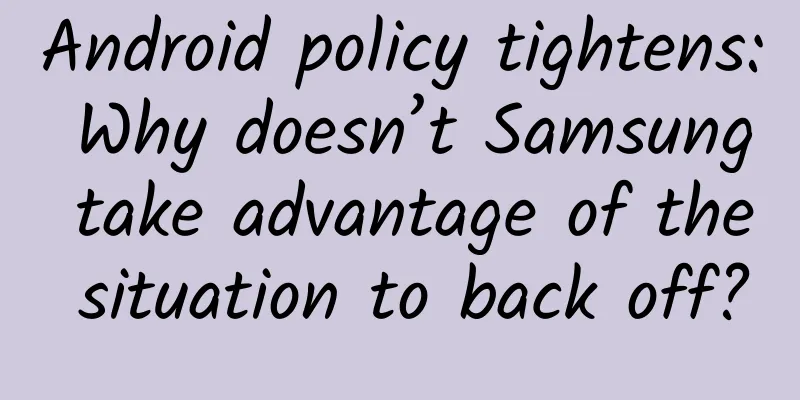Android policy tightens: Why doesn’t Samsung take advantage of the situation to back off?

|
Not long ago, when Google launched its first low-end smartphone based on the Android One system in India, Google has shown its intention to tighten the openness of its Android system. Of course, this is for the next billion smartphone users. However, for the current Android market, Google has also begun to change the terms of the cooperation agreement, with the same purpose as Android One. According to The Information, Google is forcing OEMs to pre-install more of their own apps on Android devices, increasing from 9 in 2011 to 20 in 2014. In addition, Google also requires partners to have a Google search plug-in on the home screen of their Android phones, as well as an icon for the Google Play app store, which includes 13 Google apps, including Google Chrome, Google Maps, Google Drive, YouTube, Gmail and other apps. In addition, Google also requires partners to abide by its guidelines, including hot words set for voice search and virtual assistants. In this regard, some industry analysts said that Google's move means that the battle between Google and Samsung for control of Android has officially begun. Given that Samsung has always adopted the strategy of adding its own TouchWiz software and applications to Android devices (smartphones and tablets) and emphasizing its own software functions and applications, Google's move will have a more adverse impact on Samsung, which is currently in a declining state in the smartphone market. So will Google's tightening of Android policies really be disadvantageous to Samsung? The key lies in which angle to look at it and how Samsung changes. While the industry exposed that Google's policy on Android may be further tightened, the industry revealed the number of Samsung employees in these companies based on the 10-K (or similar) documents submitted to the US Securities and Exchange Commission by companies including Apple, Google, Samsung, and Microsoft. Among them, the number of employees of Samsung (referring only to Samsung Electronics) is 275,000, which is about five times that of Google and more than three times that of Apple. Some people may ask, what is the relationship between this and the impact of Google's tightening Android policy on Samsung? Don't worry, let's take a look at what Samsung's employees with so many employees are doing? According to statistics, as of 2013, Samsung has about 40,000 software engineers, which is almost the number of Google employees responsible for software development. In fact, since Google only has about 18,000 employees in the "R&D" department (that is, the department responsible for software development), Samsung's number of software engineers should be twice that of Google. Unfortunately, everyone can name some well-known Google software. However, Samsung's software engineers, which are twice as many as Google's, do not have the same impact. The industry knows that in recent years, Samsung has paid great attention to software development and personnel construction because the outside world has been criticizing Samsung for its backwardness in software (ecosystem) and being constrained by Google Android. From 2011 to now, the number of Samsung software engineers has increased by 45%. Why maintain such a large number of software personnel? As mentioned earlier, Samsung has developed Touchwiz and a large number of Android applications. The company must install Android and Touchwiz in every new mobile phone it makes. According to statistics, Samsung has launched about 46 smartphones and 27 tablets this year alone. Imagine if a company produces more than 70 devices a year, and Android and Touchwiz are required to support all these devices, this project is really huge and resource-intensive. Of course, this also includes the development of Samsung's Tizen system. Although Samsung has invested so much manpower and material resources in software, where is the ultimate commercial value? Tizen has been repeatedly delayed. So far, only one smartwatch has adopted Tizen, but its applications on smartphones have always been thunder and no rain. As for its Touchwiz and the large number of Android applications developed for it, how much differentiated competitive advantage has it brought to Samsung in the Android smartphone camp (especially compared with the Android native system and applications that are about to be tightened)? How many Samsung mobile phone sales have been driven in the end? What real value has Samsung's time-consuming and labor-intensive software brought to users? It is said that Samsung phones usually have about 70 pre-installed apps. According to comScore's latest mobile app survey, in the United States, 65% of smartphone users do not download an app in a month, while nearly 25% of smartphone users only download 1-3 apps per month. 42% of users' app usage time is spent on the app they use most often. This shows that people already have apps that can meet their daily needs, and it seems unnecessary to download more apps. Even one is enough. According to a report recently released by financial services company Deloitte, nearly 1/3 of smartphone users usually do not download any apps in a month. It can be seen that smartphone users do not have many choices for apps that meet their real needs. Moreover, users also have Google Play, the largest Android app store. Is it really necessary for Samsung to invest so much manpower and material resources in this? As for new ecosystems (such as Tizen), it is even more wasteful and unnecessary. At this point, some people may say that building their own ecosystem is to avoid being controlled by Google in the future, but the problem is that Samsung is still the main force in the Android camp. As long as it complies with Google Android's requirements and specifications, what reason does Google have to contain a heavyweight manufacturer that supports it? The reason why Samsung has aroused Google's vigilance and concern is precisely Samsung's huge investment in software and ecosystem. As we all know, Samsung's smartphone business has experienced a decline in performance. The main reason for the decline is that it has been hit by more "cost-effective" smartphones from Chinese manufacturers in the mid- and low-end markets. This also seems to indirectly prove that Samsung's efforts in systems and software have not brought it substantial competitiveness. For this reason, some industry insiders suggest that Samsung should focus on the mid- and low-end markets in the future, but this will inevitably lead to a decline in Samsung's profit margins. So does Samsung have room to make up for it? This involves what we mentioned earlier, why doesn't Samsung take advantage of the opportunity we mentioned earlier, that is, take advantage of Google's tightening Android policy to truly return to the embrace of Android, stop investing so many resources and doing useless work on its own software and systems, and use the saved software resources (manpower, material and financial resources) to compete on the "cost-effectiveness" of hardware attributes, because this is the core advantage of Samsung's previous success and the possibility of reversing its performance decline in the future. As a winner of Toutiao's Qingyun Plan and Baijiahao's Bai+ Plan, the 2019 Baidu Digital Author of the Year, the Baijiahao's Most Popular Author in the Technology Field, the 2019 Sogou Technology and Culture Author, and the 2021 Baijiahao Quarterly Influential Creator, he has won many awards, including the 2013 Sohu Best Industry Media Person, the 2015 China New Media Entrepreneurship Competition Beijing Third Place, the 2015 Guangmang Experience Award, the 2015 China New Media Entrepreneurship Competition Finals Third Place, and the 2018 Baidu Dynamic Annual Powerful Celebrity. |
<<: Why are iPhone 6 and iPhone 6+ so easy to bend?
Recommend
7 major trends in mobile app marketing and promotion in 2019!
In today's mature application market, consume...
The most complete official contact information for Apple App Store!
The main contact methods currently published by A...
Cold knowledge | The way to get rid of pain is to live well
One minute with the doctor, the postures are cons...
Android M full name Android Marshmallow
Last week, Google released a promotional video fo...
Event promotion: Improve the conversion rate of offline activities?
This article will use offline activity cases to a...
Foreign media: If you are still using an older model, it is worth upgrading to iPhone 13
According to foreign media macrumors, comparing t...
Do you know the five major pain points of laser TV before buying it?
Laser TVs are gaining more and more attention, bu...
How to choose promotion channels? Look at these 5 principles and 4 dimensions
Under the epidemic, traffic has shifted online an...
What novel and wonderful manned lunar landing plans and tools were designed in the Apollo project?
The entire Apollo manned lunar landing project la...
Is the "Hellhound" variant "killing people like crazy" in Japan? Here's the truth!
Since the global outbreak of the COVID-19 pandemi...
Can the establishment of a car rental company break the deadlock?
As the discussion on "private cars" con...
Public account disk says "Swordsman" teaching video
Public account Panmian said "Swordsman"...
What kind of rain is considered heavy rain? Why are 50 and 100 mm important rainfall scale nodes?
Review expert: Ye Haiying, deputy director of the...
Tell your parents! Huaxi doctors: Using these bags to store food can really cause food poisoning
The old-style pickled cabbage of 315 is still fre...
The missing general manager of Xiaomi TV, why Xiaomi, who loves the Avengers, can't cultivate its own Richard Yu
Xiaomi TV has hit a growth ceiling, and its gener...








![Ahua Pet Group Training July 2021 iPad Illustration Course [HD with Brush Materials]](/upload/images/67cc2735a7a14.webp)
